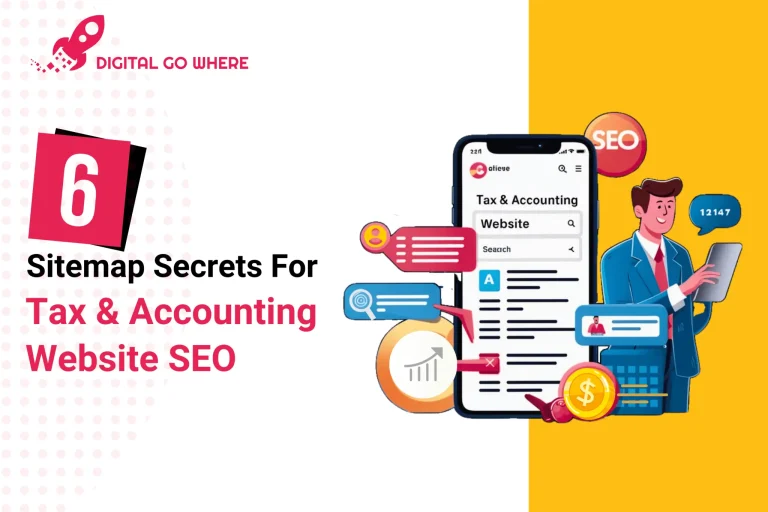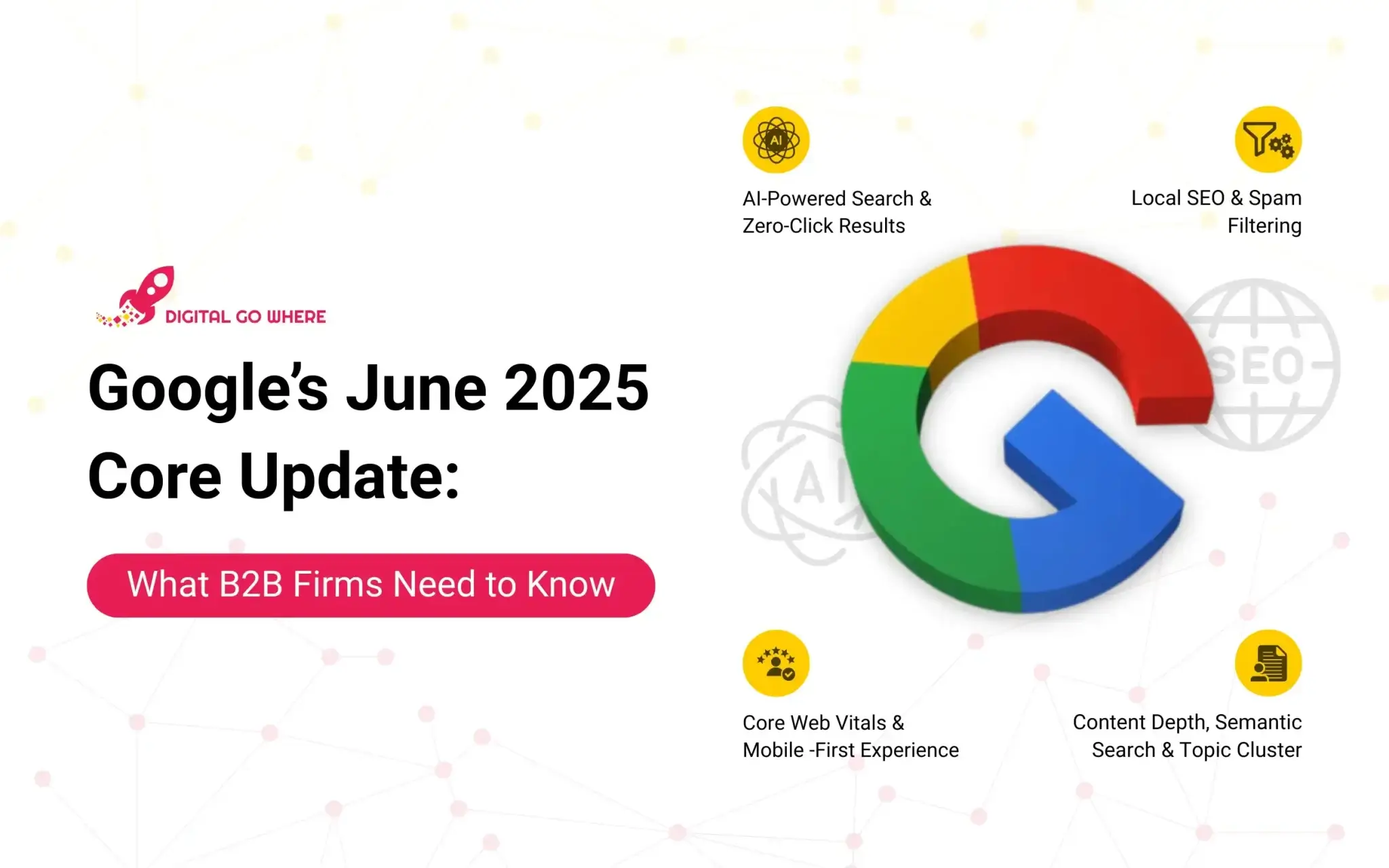Google Core Update June 2025: Impact on B2B

Google has made it categorically clear that trustworthy and genuinely helpful content is non-negotiable. The June 2025 Update places greater emphasis on clarity, intent, and lasting value, especially for B2B service providers that rely on search visibility to build credibility. It is no longer just about where you rank. What matters now is how relevant and useful your content is to real people. If you can answer expert-level questions with clear, well-organised information, your content is far more likely to perform well in the long run.
In this blog, we break down the key changes in Google’s algorithm, what they mean for B2B firms, and share practical, no-fluff SEO strategies to help your website stay visible, trusted, and aligned with what your ideal clients are searching for.
- Understanding Google’s 2025 Algorithm Update
- What Changed in the June 2025 Core Update
- What This Means for B2B Sites
- Comparing the August 2024 and June 2025 Updates
- Impact on B2B, Finance, and Accounting Websites
- How to Adjust Your Strategy After the Update
- Looking Ahead: Building Long-Term SEO Resilience
- Conclusion
Understanding Google’s 2025 Algorithm Update
- 1. Google now gives more weight to content that is helpful than to pages that are overflowing with keywords.
- 2. Content shouldn’t just exist for search engines; it should also provide clarity, aid in decision-making, or solve a problem.
- 3. Websites with out-of-date or generic content are becoming less visible.
- 4. Websites that provide regular, organized, and perceptive content are being rewarded.
- 5. This is a strong indication for B2B brands to invest in audience-focused content that demonstrates genuine expertise and offers tangible benefits.
If you operate in a competitive B2B field, this update serves as a reminder to move beyond quick SEO fixes. Focus on creating content that your audience will keep coming back to, because it genuinely helps them.
What Changed in the June 2025 Core Update
1. Long-Term Value Matters More Than Quick Fixes
Google is now looking at how your content performs over time. Pages that deliver steady value and are consistently updated tend to perform better than those with only recent edits or temporary boosts. It’s a reminder to invest in evergreen content and thoughtful updates that help users.2. Real Substance Wins
Websites with thin, surface-level information have seen dips in visibility. What’s ranking higher now? Detailed, well-researched content that speaks directly to user needs—think practical guides, use-case examples, or sector-specific insights tailored to business decision-makers.3. Search Intent Matching Is Smarter
Google has become much better at understanding what users are looking for. If your site fails to answer specific or relevant queries, you may be overlooked. But if your pages match specific business queries—like “how to handle multi-country payroll” or “EOR compliance checklist”—you’re more likely to get visibility.4. User Experience Signals Carry More Weight
Beyond content, Google’s also giving more attention to how your website functions. Factors such as page speed, mobile-friendliness, and clean navigation now play a more significant role in rankings. If your site is clunky or slow, it might be hurting your chances, regardless of how good your content is.What Changed in the June 2025 Core Update
1. Long-Term Value Matters More Than Quick Fixes
Google is now looking at how your content performs over time. Pages that deliver steady value and are consistently updated tend to perform better than those with only recent edits or temporary boosts. It’s a reminder to invest in evergreen content and thoughtful updates that help users.2. Real Substance Wins
Websites with thin, surface-level information have seen dips in visibility. What’s ranking higher now? Detailed, well-researched content that speaks directly to user needs—think practical guides, use-case examples, or sector-specific insights tailored to business decision-makers.3. Search Intent Matching Is Smarter
Google has become much better at understanding what users are looking for. If your site fails to answer specific or relevant queries, you may be overlooked. But if your pages match specific business queries—like “how to handle multi-country payroll” or “EOR compliance checklist”—you’re more likely to get visibility.4. User Experience Signals Carry More Weight
Beyond content, Google’s also giving more attention to how your website functions. Factors such as page speed, mobile-friendliness, and clean navigation now play a more significant role in rankings. If your site is clunky or slow, it might be hurting your chances, regardless of how good your content is.What This Means for B2B Sites
There’s no quick hack: This update reinforces the need for sustainable SEO practices. If your strategy is just patching weak spots, it’s time to think bigger.
Action Plan for B2B Sites :
| Focus Area | What You Should Do |
|---|---|
| Content Quality | Expand thin pages and back them with research, examples, and meaningful insights. |
| Search Intent Alignment | Tweak pages to answer specific B2B questions, especially in niche service areas. |
| Site Performance | Improve loading speed, test mobile experience, and simplify navigation. |
| Monitor Performance | Track ranking shifts and user behaviour through Google Search Console and SEO tools. |
Comparing the August 2024 and June 2025 Updates
| Key Area | August 2024 Update | June 2025 Update |
|---|---|---|
| Rollout Duration | 19 days | 16 days |
| Primary Focus | Improve helpful content, reduce low-effort SEO | Refine user satisfaction signals, prioritise long-term value |
| Content Quality Signals | The original, problem-solving content was rewarded | Structured, consistently valuable content got a stronger push |
| Search Intent Handling | Better matching of broad/niche queries | A deeper understanding of the user goals behind similar phrases |
| Impact on Thin Content | Low-value or generic pages were demoted | Shallow content with no sustained relevance loses visibility |
| Technical SEO Importance | Important but not dominant | Became a core ranking factor (page speed, UX, mobile optimisation critical) |
| Volatility by Industry | Moderate fluctuations; niche publishers benefited | Higher volatility, especially in B2B, finance, payroll, and EOR-related websites |
| Winning Content Traits | Helpful, authentic, and user-focused | Detailed, stable, and aligned with long-term user expectations |
| Outcome for B2B Sites | Lift for firms offering expert guidance in their domain | Firms with structured, evergreen content saw greater and more stable gains |
Impact on B2B, Finance, and Accounting Websites
1. Clear and Useful Content Is Performing Better
Websites that publish surface-level or generic articles are losing ground. On the other hand, businesses that share in-depth, relevant, and original insights—such as payroll law changes, tax advice, or compliance tips—are gaining better visibility. Content that directly answers real questions is now ranking higher.2. Trust Signals Are Gaining More Weight
Firms that show real people behind their content are benefiting. For example, sites that include author names, professional bios, and up-to-date legal or financial disclaimers are being recognised as more reliable. In regulated sectors like accounting and HR, this can make a significant difference in how users and search engines view your site.3. User Experience Is Driving Results
Finance and B2B websites that are easy to navigate, mobile-friendly, and fast-loading are seeing stronger performance. If your website is cluttered or difficult to use, that may be impacting your traffic. Clean structure, strong internal links, and helpful page layouts are proving to be essential factors in achieving success.4. Old and Low-Value Pages Are Dragging Sites Down
Many businesses maintain outdated service pages or blog posts online solely to increase content volume. But this update has made it clear that quality matters more than quantity. It may be time to review older pages, update or remove what’s no longer helpful, and focus on content that adds real value.5. AI-Generated Content Needs a Human Touch
While Google does not penalise content made using AI tools, it is clearly favours pages that reflect human thought, expertise, and clarity. For B2B teams using AI for scaling, ensure your content is reviewed and customised to meet your audience’s specific needs.Tip: For finance, EOR, or compliance, ensure your B2B content is clear, practical, and easy to use. With Google’s most recent updates, it performs better and gains credibility.
How to Adjust Your Strategy After the Update
1. Check What’s Dropping
Noticed a dip in traffic or rankings? Don’t jump to conclusions. Instead, look closely at which pages have been affected. It might be a sign that the content needs a refresh, a more transparent structure, or a sharper focus. Think of it as an opportunity to align more closely with what your audience is actually searching for.2. Add Value, Not Just Volume
Instead of pumping out multiple blogs every week, focus on content that answers fundamental questions. A detailed guide on payroll compliance for small businesses, for example, will go further than a generic article on “how to manage payroll.”3. Make Navigation Easy
Help your users (and search engines) navigate your website smoothly. Link related articles, group your topics meaningfully, and ensure that people can find what they need with as few clicks as possible.4. Boost Page Experience
Speed matters. So does mobile-friendliness. If your website is slow, hard to navigate, or not optimised for mobile, it’s time for a tune-up. These factors now play a crucial role in determining your site’s ranking.5. Write Smarter Titles and Descriptions
Your page titles and meta descriptions should clearly convey your message to your audience. Think about what would make someone click on your link in a sea of similar search results. A clear benefit or outcome always helps.6. Build Trust Through Clarity
Especially for content that deals with rules, money, or regulations, back it up with real insights or expert input. This doesn’t mean you need a big name—just clarity, accuracy, and transparency in what you share.7. Track What’s Working
Give it a few weeks and check in again. Utilise Google Search Console and analytics to determine which pages are recovering, which are gaining traction, and which require further attention. Core updates don’t happen all at once—it’s a process, not an event.Looking Ahead: Building Long-Term SEO Resilience
1. Understand What Your Audience Is Really Searching For
Don’t just focus on keywords. Try to understand the why behind each search. Are they looking for quick answers, step-by-step guides, or expert insights? Tailor your content to match those needs directly.2. Keep Updating What Matters
In fields such as finance and payroll, rules and regulations are subject to frequent changes. Ensure that your key pages reflect the most up-to-date information. Set a routine to review and update your most important content.3. Improve User Experience
A smooth, fast, and mobile-friendly website is now a basic expectation. If users get frustrated or confused on your site, they’ll leave—and that can impact both rankings and trust.4. Become a Go-To Resource in Your Niche
Instead of trying to cover everything, focus on building deep expertise in a few core areas. When people trust your content for one topic, they’re more likely to return for others.5. Don’t Panic Over Every Update
Not every algorithm change requires a complete overhaul. Continue to track performance, adhere to best practices, and remain flexible. A steady, well-rounded strategy is more sustainable than constant patchwork.Tip: The most resilient SEO strategies are the ones that prioritise people, not just search engines. If your content genuinely helps your audience, search visibility will follow.
Conclusion
One thing is evident from Google’s June 2025 update. A comprehensive online presence is now the primary goal of effective SEO, encompassing not just keywords or rankings. This is an excellent time for B2B websites in the fields of finance, HR, payroll, and EOR to reassess how well their content is serving their audience’s needs.
Rather than chasing every algorithm tweak, it is more effective to focus on creating content that is genuinely useful, loads fast, and is well structured. When your website delivers real value to real people, improved search performance tends to follow naturally.
This update is not just a disruption. It is an opportunity to create a more stable, trustworthy, and growth-oriented digital presence. Prioritising clarity, consistency, and relevance today will help your business stay ahead in search tomorrow.




